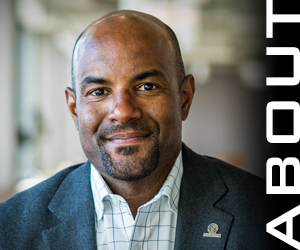CEO Outlook | Spring 2025
Will You Stand Up When Others Step Down?
As diversity, equity, and inclusion programs fall to scrutiny, we need to stand up for what’s best for the future of the accounting profession.

Geoffrey Brown, CAE
President and CEO, Illinois CPA Society
Insights From Your President and CEO
Earlier this year, Chicago’s very own Mary T. Washington Wylie was announced as the 124th inductee into the American Accounting Association’s Accounting Hall of Fame, cementing her legacy as a certified public accountant (CPA) that’s “made a significant contribution to the advancement of accounting.” Her recognition is especially meaningful because she was the first Black female CPA in the United States (and just the 13th Black CPA overall), is heralded as a trailblazer for her record of helping so many aspiring CPAs enter the profession, and was instrumental in turning Chicago into a prosperous hub for Black CPAs and businesses to thrive.
Throughout her life, Wylie exhibited unwavering commitment in her mission to support young Black CPAs and create opportunities for them in a profession that was still largely inaccessible to the Black community. Her firm became a vehicle for Black accountants to gain the experience necessary for CPA licensure. I highlight this not only because of Wylie’s remarkable achievements but because, without even knowing it, she was doing her part to address the profession’s earliest human capital needs.
Fast forward to today, and countless organizations essential to our profession’s future workforce are making changes to their talent development programs and initiatives in response to Trump administration executive orders. In the face of this, I contend that we can’t afford to lose sight of what’s at stake. As I previously shared, our profession is facing two steep demographic cliffs carved out of a sustained period of declining U.S. birthrates and an unprecedented number of working Americans reaching retirement age each year. The former is setting us up for lower college enrollment rates and likely even fewer accounting graduates, while the latter positions the profession to experience a knowledge deficit driven by the growing number of professionals that are expected to retire in the coming years.
Given these cliffs we’re quickly approaching, and the accounting profession’s current talent shortage, we can’t lose sight of the
importance of efforts to recruit and retain the next generation of talent—including individuals from underrepresented populations who’ll be essential for serving an increasingly diverse population. For the sake of the profession, we must continue intentionally focusing on solidifying and supporting thoughtful opportunities that address the trickling talent pipeline.
In its final report, the National Pipeline Advisory Group (NPAG) recommended “prioritizing strategies to expand access for the underrepresented at every stage.” NPAG believes (and I agree) that we can increase awareness of accounting careers among underrepresented populations through targeted messages, scalable college-bound and early career experiential programs, and closer relationships between the profession and academic institutions with high minority populations.
However, with diversity, equity, and inclusion programs facing increased scrutiny, and many organizations quickly stepping away from them, the profession’s efforts to successfully address its human capital challenges may be in jeopardy.
Our profession simply can’t afford to lose the positive momentum and stakeholder alignment it’s developed in recent years. Instead, we need to embrace Wylie’s legacy and create more opportunities that make the profession accessible to the next generation of talent. We need to champion addressing the talent issues within our organizations by continuing to create space for those that haven’t historically had it. We need to find our passion for mentoring and hiring young and aspiring CPAs from all backgrounds to help them gain the experience they need to earn their CPA licenses—a license that can only be earned on merit.
At a minimum, I implore those in positions of influence to stand up and do what’s best for the future of our profession.
Related Content: